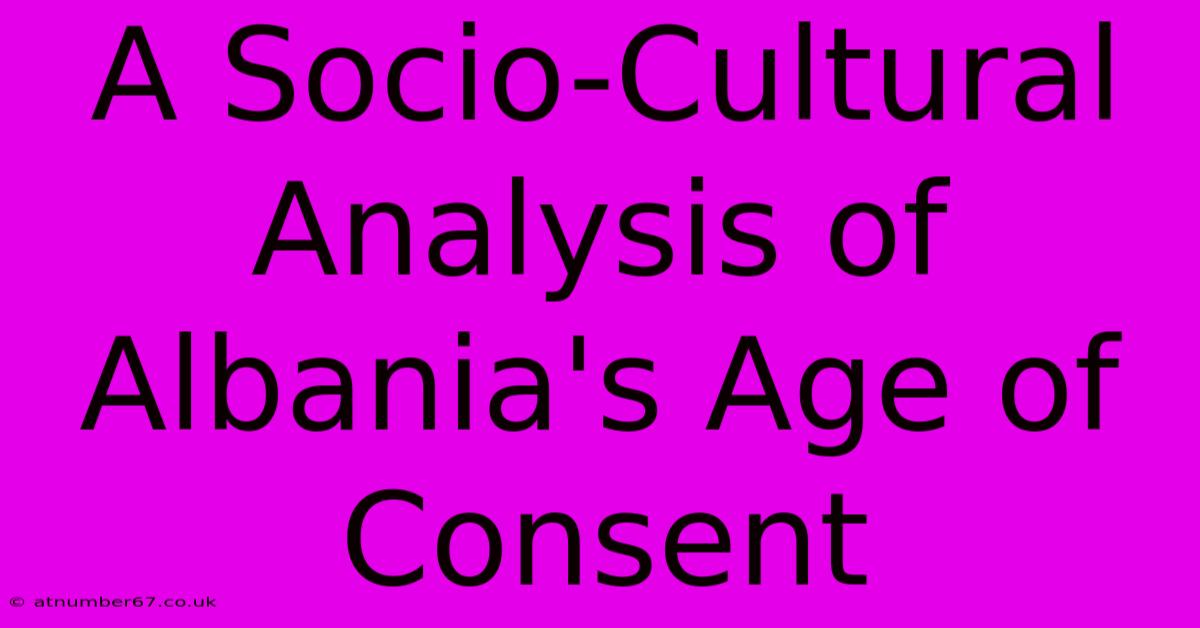A Socio-Cultural Analysis Of Albania's Age Of Consent

Table of Contents
A Socio-Cultural Analysis of Albania's Age of Consent
Albania, a nation with a rich and complex history, grapples with contemporary issues shaped by its unique socio-cultural landscape. One such issue is the age of consent, a legal and social boundary with significant implications for child protection and societal norms. This article delves into a socio-cultural analysis of Albania's age of consent, exploring the legal framework, societal attitudes, and the challenges in achieving comprehensive protection for minors.
The Legal Framework: A Starting Point
Albania's legal framework concerning the age of consent is defined within its criminal code. The age of consent in Albania is 14 years old. This relatively low age, compared to many European countries, raises concerns regarding the vulnerability of adolescents and the potential for exploitation. While the law criminalizes sexual activity with minors below this age, enforcement and awareness remain significant challenges. The legal definition itself doesn't encompass the nuances of power imbalances, coercion, or grooming, which often characterize exploitative relationships involving minors. This gap highlights the need for a more comprehensive legal framework that addresses these critical aspects.
Gaps in Legal Protection: Beyond the Numbers
The numerical age of consent alone is insufficient to address the complexities of sexual abuse. The legal framework must explicitly address:
- Grooming: The insidious process of building trust and manipulating minors before engaging in sexual activity.
- Coercion and Exploitation: Situations where consent is not truly freely given due to power imbalances, threats, or manipulation.
- Child Marriage: While outlawed in principle, child marriage persists in certain communities, highlighting the need for stronger enforcement and community engagement.
- Lack of Awareness: Many individuals, including minors themselves, may not be fully aware of their rights and the legal consequences of sexual activity below the age of consent.
Socio-Cultural Influences: Tradition and Modernity
Albania's socio-cultural context plays a significant role in shaping attitudes towards sexual behavior and child protection. Traditional patriarchal structures and a culture of silence surrounding sexual matters can hinder efforts to protect minors. While significant progress has been made in recent decades, ingrained social norms and a lack of open dialogue can contribute to underreporting and a lack of accountability.
The Role of Family and Community:
Family and community structures often influence perceptions of acceptable sexual behavior, especially concerning adolescents. Conservative attitudes and limited access to comprehensive sex education can leave young people vulnerable. The influence of extended family systems and traditional gender roles can further complicate the picture, making it challenging to address issues of consent and abuse effectively.
Impact of Poverty and Marginalization:
Poverty and marginalization can exacerbate the vulnerability of children to exploitation. Economic hardship can force families into situations that compromise children's safety, and access to resources, including legal aid and support services, can be significantly limited in impoverished communities.
Challenges and Recommendations: Moving Forward
Addressing the complex issue of child sexual abuse in Albania requires a multifaceted approach that goes beyond simply defining the age of consent:
- Raising the Age of Consent: A significant step towards better protecting children would be raising the age of consent to align with international standards and best practices.
- Comprehensive Sex Education: Implementing age-appropriate and comprehensive sex education in schools is crucial in empowering children with knowledge about their bodies, consent, and their rights.
- Strengthening Law Enforcement: Improved training for law enforcement officials to effectively investigate and prosecute cases of child sexual abuse is essential.
- Community Engagement: Working with community leaders, religious organizations, and civil society groups is crucial to changing attitudes and promoting a culture of open dialogue and accountability.
- Support Services: Providing readily accessible support services for victims of child sexual abuse, including counseling and legal aid, is critical for their healing and recovery.
Conclusion:
Analyzing Albania's age of consent requires a holistic understanding of its legal framework and socio-cultural context. While the legal definition provides a starting point, it's crucial to address the broader societal factors that contribute to child vulnerability. A multi-pronged approach that incorporates legal reforms, education, community engagement, and support services is necessary to ensure the effective protection of children and promote a society that prioritizes their well-being. Only then can Albania effectively safeguard its most vulnerable members and build a future free from exploitation and abuse.

Thank you for visiting our website wich cover about A Socio-Cultural Analysis Of Albania's Age Of Consent. We hope the information provided has been useful to you. Feel free to contact us if you have any questions or need further assistance. See you next time and dont miss to bookmark.
Featured Posts
-
The Secret Behind Kim Soo Hyuns Massive Net Worth
Apr 02, 2025
-
Discover The Importance Of Antigens
Apr 02, 2025
-
Gen X Age Range Your Journey To Self Discovery
Apr 02, 2025
-
Jurassic Age Dti Transform Your Mindset
Apr 02, 2025
-
Musk Net Worth Whats Next For Elon
Apr 02, 2025
